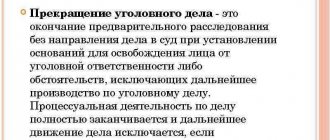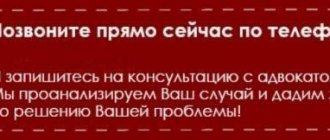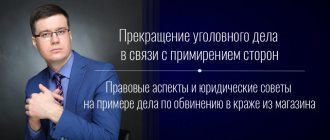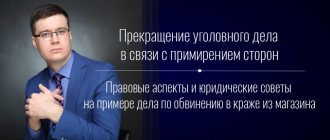Art. 155 of the Code of Criminal Procedure of the Russian Federation establishes the rules by which an inquiry officer or investigator acts if, during the investigation, he received information indicating the possible commission of another crime not directly related to this case. In practice, such a need often arises, since the formation of a motive for an offense in one person is often due to the illegal activities of other people. With high-quality work by detectives, the facts are revealed and require legal assessment. Separating the materials of a criminal case is a reasonable and fair solution for such a situation: deadlines are met, signals are not left unattended, the rights of the suspect, accused, and victim are respected.
Multi-channel free hotline Legal advice on criminal law. Every day from 9.00 to 21.00
Moscow and region: +7 (495) 662-44-36
St. Petersburg: +7 (812) 449-43-40
Registration procedure
Isolating materials is a simple procedure. Evidence indicating a potential crime is taken from a criminal case and sent accordingly to the head of the investigative agency or inquiry for the adoption of orders. But a certain order must be observed.
The investigator, the head of the inquiry body, the investigator or the head of the investigative team, acts according to the plan:
- Analyzes the information received at his disposal and makes a decision to separate some of it into separate production.
- Draws up a special resolution on a form. A copy is filed in the criminal case. The sample resolution is not officially fixed, but must contain all the mandatory details used when writing criminal procedural acts.
- Takes down duplicates of protocols and other written evidence, and files the original resolution with them. The originals, as a rule, remain in the file, but are sometimes attached to the material.
- Submits completed documents to the appropriate manager.
- A copy of the decision is sent to the prosecutor.
If the head of the investigative body himself conducts the investigation of the main case, then in the resolution he immediately appoints the person whom he instructs to conduct the inspection. In this case, documents are not sent to higher management.
Clearly followed rules are the key to compliance with the law and a full investigation.
Selection of materials
The segregation of a separate case is not carried out for the same reasons as the segregation of materials. Despite the fact that these events are quite similar, they are completely different procedural manipulations.
The separation of a production facility is carried out from a previously opened single case. As for the selection of materials, this process is carried out during the investigation of new defendants or recorded criminal episodes.
Materials are highlighted if they are not related either by the similarity of actions or by the general subject composition with the main case. The main point with such a distinction is the opening of a case based on a certain circumstance and the conduct of updated investigative operations.
The law enforcement officer, even if new factors have been established, does not have the right to apply a procedural decision regarding the opening of a new case. He must take the following steps:
- A decision is made on those materials that contain information proving the existence of events of new violations;
- A package of papers is sent to an employee of the investigation or prosecutor's office. This is necessary to make a decision under Art. 144 and 145 Code of Criminal Procedure.
The period of investigation in a separate case is calculated according to the general rules. The starting date is considered to be the day of initiation. Materials that are regarded as the basis for the necessary separation are given status in new proceedings.
Deadlines for making a decision
Separation into a separate production obliges the inspection to be completed quickly. The materials of the criminal case may be sufficient to make a decision within three days.
This time may be extended:
- As a general rule, a decision is made within three days from the moment the investigator or interrogating officer receives an order from the manager.
- The head of the investigation or inquiry, at the request of the person conducting the inspection, has the right to extend the period for clarifying the circumstances to ten days. This option occurs quite often, but the reason for the extension must be justified.
- The prosecutor has the right to increase the period up to thirty days at the request of the investigator or the head of the investigative body at the request of the investigator. This requires a serious basis in the form of inventories, audits, extensive research with the involvement of specialists. The reasons for the extension must be indicated in a special resolution.
Based on the results of the work, a decision is made to initiate a new criminal case or to refuse it. It is possible to transfer the material to the relevant authorities for the imposition of an administrative penalty, or in cases of private prosecution - to the court. The selected material cannot be left without study and legal assessment.
Commentary on Article 155 of the Code of Criminal Procedure of the Russian Federation
1. The grounds for separating materials must be distinguished from the grounds for separating a case (Article 154 of the Code of Criminal Procedure). Material is allocated to a separate proceeding if three conditions are simultaneously met: a) “other persons” have either not yet been identified or have not yet been brought in as suspects or accused. If separation is required in relation to a suspect or accused, then it is necessary to separate the case under clause 3 of part 1 of Art. 154; b) when, before singling out, it is obvious that there is no connection between the “main” crime and the fact being singled out. If this connection is not obvious, then a single case is investigated. If a lack of communication is established after an investigation, a case may be opened under clause 3 of part 1 of Art. 154; c) there is insufficient information about the fact being highlighted that indicates the signs of a crime (for example, the investigator assumes that a crime has been committed under “someone else’s” jurisdiction). If at the time of separation there is sufficient data on the signs of a crime - grounds for initiating a case, then a new case should be opened and allocated under Part 3 of Art. 154.
2. For evidence, see com. to Art. Art. 74 - 75.
Consequences for the suspect (accused)
Participants in the process often have questions about what changes may occur and whether their position will worsen or improve in connection with the start of a separate audit.
It is important to understand that the procedure does not have an accusatory bias and is carried out for the sole purpose: a high-quality and comprehensive investigation. Need to know:
- the period of investigation into an already initiated case does not increase;
- the selected documents continue to retain the status of evidence.
Actions in accordance with Article 155 of the Criminal Procedure Code of the Russian Federation are taken in relation to facts that are not directly related to the suspect (accused) and cannot worsen the latter’s position, unless during the inspection facts of his involvement in the commission of other crimes are revealed.
Procedure for separating a case
The division of the process is carried out in such a way as to completely eliminate any possible threat to impartiality and comprehensive consideration. From the point of view of the criminal code, this measure is considered forced.
The reason is that there is a negative impact on the comprehensiveness of the investigation. These parameters remain low, despite the fact that the circumstances of the disconnected factors are in a special feedback relationship. They can be cited as evidence in two processes.
Separation of a criminal case. Separation of case materials into separate proceedings.
The separation of a criminal case means the removal of part of its materials from the main proceedings as an independent criminal case (Article 154 of the Code of Criminal Procedure). Isolating is the exact opposite of connecting things together. The separation of cases ensures: a) the objectivity of the investigation by creating a special production regime (individualization) for certain categories of persons; b) the speed of the investigation and its “procedural economy”, i.e. the ability to continue or complete pre-trial proceedings, despite the obstacles that have arisen.
As a general rule, the separation of a criminal case is allowed in relation to the accused. As an exception, it is possible to separate a case against suspects (for example, during an inquiry where there is no accused, but there may be a suspect).
The grounds for identifying criminal cases can be divided into two groups. The first includes the grounds for separating a case against certain persons
:
· the presence of certain grounds for suspending the criminal case against some of the identified accomplices (clauses 2–4, part 1, part 3, article 208);
· the minor age of the accused brought to criminal liability for committing a crime in complicity with an adult (Article 422);
· absence of connection between the acts of other persons suspected or accused of committing crimes not related to the acts charged in the criminal case under investigation, if this became known during the preliminary investigation. For example, in a case initiated on the basis of arson, it was established that the suspects in the arson or other persons had previously committed robbery;
· refusal of some accused to consider their case by a court with the participation of a jury when requesting a trial of a case with the participation of a jury of other accused, if this does not harm the comprehensiveness and objectivity of the consideration of the case (clause 1, part 5, article 217);
· the insanity of one of the accomplices or the onset of a mental disorder after committing a crime (Article 436);
· objections of accused persons who are not military personnel or citizens undergoing military training to the consideration of their case by a military court (when in relation to other accused in this case it is within the jurisdiction of a military court - part 7 of article 31 of the Code of Criminal Procedure).
· concluding a pre-trial cooperation agreement. In the event of a threat to the safety of the suspect or accused, the materials of the criminal case identifying his identity are withdrawn from the criminal case initiated and added to the criminal case against the suspect or accused, separated into separate proceedings (clause 4, part 1, article 154).
The second group of grounds for separating a criminal case in relation to crimes (facts)
includes, firstly, the need to complete the investigation into some episodes of criminal activity or in relation to individual defendants.
This refers to situations where some episodes have already been fully investigated, while others have not yet. To avoid delays in the inquiry, investigation and detention, the “ready” part of the case can be separated for sending to court. This institution implements the international legal principle of access to justice without undue delay (clause “c” of Part 3 of Article 14 of the Covenant on Civil and Political Rights). The condition for isolating a criminal case on this basis is to ensure the comprehensiveness and objectivity of the investigation
and resolution of the case (Part 2 of Article 154 of the Code of Criminal Procedure), which must be observed due to the importance of the principle of truth in criminal proceedings.
Secondly, a criminal case can also be separated for the investigation of a new crime
committed by the same persons, or in relation to
a new person
. In this case, the resolution may also decide to initiate a case in accordance with Art. 146 Code of Criminal Procedure. The question of the need to initiate a case during separation must be decided taking into account the basis on which the main, initial case was initiated. A separate case must be initiated if: a) the act being investigated in it is not an integral part of the crimes for which the original criminal case had already been initiated. In this case, it is necessary to be guided by the spatio-temporal characteristics of those events that are described in the decision to initiate the main criminal case. For example, if a criminal case was initiated based on a number of thefts committed during a certain month on the territory of a holiday village, then the separation of a criminal case in connection with a new theft committed outside of this month and (or) village requires initiation; b) it is allocated in relation to those persons who were not indicated in the decision to initiate the main case initiated against a specific person. For example, if a criminal case was initiated based on the fact of causing harm to health (by an unknown person), then the establishment of new accomplices does not require the initiation of new cases. If a case has been initiated against a specific suspect, then the identification of new accomplices usually requires a new decision to initiate a case.
The period of preliminary investigation in a criminal case separated into separate proceedings is calculated from the date of the relevant decision, if the case is separated for a new crime or in relation to a new person. In other cases, the period of investigation in a separated case is calculated from the moment of initiation of the main criminal case, from which it was separated into separate proceedings (Part 6 of Article 154). The period of detention is calculated in accordance with the general procedure established by Art. 109.
The current Code of Criminal Procedure, along with the separation of a criminal case, allows for the separation of criminal case materials into separate proceedings
(Article 155).
This is possible if two conditions are met simultaneously. Firstly, the separation of materials is allowed only in relation to persons who have not yet been identified, or persons who have not yet been brought in as suspects or accused (otherwise it is necessary to separate the criminal case under clause 3, part 1, article 154). Secondly, the decision to allocate materials is made only if there is an obvious lack of connection
between the “main” crime and the fact being allocated. If there is a possibility that such a connection exists, the investigation continues as a single case.
A reasoned decision is made on the release of materials, which, together with the material, is sent by the investigator to the head of the investigative body, and by the investigator to the prosecutor as a reason for initiating a case.
3. Beginning, duration and end of the preliminary investigation.
The speed of the investigation is ensured by its timely start, a certain period of production and the forms of completion provided for by law.
The preliminary investigation stage begins from the moment a decision is made to initiate a case, at which, in accordance with the requirements of Part 2 of Art. 146 of the Code of Criminal Procedure, in addition to the date, the time of its issuance must be indicated.
The duration of the preliminary investigation ensures: a) control over the progress of the investigation (including from the side of the victim and the accused); b) the international legal principle of access to justice without undue delay (clause “c” of Part 3 of Article 14 of the Covenant on Civil and Political Rights); c) maximum reduction of time between punishment and crime as a condition for the effectiveness of punishment; d) the duration of procedural coercive measures. The period of preliminary investigation is regulated separately for inquiry (Article 223) and for preliminary investigation (Article 162).
As a general rule, the period of preliminary investigation is 2 months. However, to ensure the speed of investigation of the case, if possible, the investigation should be completed as early as possible, without waiting for the expiration of this period.
The beginning of the 2-month investigation period is the day the case was initiated, and the current day is not taken into account. Therefore, the period begins to run from the beginning of the next day (Article 128). To calculate the period of investigation, it does not matter which body initiated the criminal case, therefore the period of investigation includes the time when urgent investigative actions were carried out by the investigative body (Article 157), as well as the time of the inquiry (Article 223) after the case was sent for investigation (Clause 4 Part 1 Article 226).
The end of the preliminary investigation period occurs on the day: a) the decision to terminate the case is issued (Article 213, paragraph 1, part 1, Article 439) or b) the criminal case is sent to the prosecutor (with an indictment - part 6 of Article 220 or with a resolution to transfer the case to court for the application of a compulsory measure of a medical nature - clause 2, part 1, article 439). The terms of further activities of the prosecutor are established separately (10 days with the possibility of extension to 30 days on the indictment - part 1 of article 221 and 2 days on the indictment - part 1 of article 226). In contrast to the period of preliminary investigation, the period of inquiry ends on the day of drawing up the indictment, and the time for familiarization of the parties with the case materials is not included in the period of inquiry.
The procedural law allows for the possibility of only two breaks during the investigation: firstly, for the duration of the suspension of the case due to the impossibility of participation in the case of the suspect or accused, when his whereabouts are known (clause 3, part 1, article 208), or in in case of his serious illness (clause 4, part 1, article 208); secondly, during the investigator’s appeal of the prosecutor’s decision to return the criminal case to the investigator for additional investigation (clause 2, part 1, article 221). The entire period of familiarization of the participants in the process with the materials of the completed preliminary investigation is included in the period of the preliminary investigation (Articles 216, 217).
Extension of the initial 2-month period of preliminary investigation can occur in 3 stages (parts 4–5, 7 of Article 162):
1) up to 3 months (for another 1 month) - by the head of the investigative body at the district level, including his deputy (clause 38.1 of article 5);
2) up to 12 months - by the head of the investigative body at the level of a constituent entity of the Russian Federation and his deputies. The reason for the extension is the particular complexity of the investigation, for example, associated with the need to carry out a significant number of investigative actions, travel to another locality, send a request for legal assistance to a foreign state, place the accused in a medical hospital for an examination, etc.;
3) further extension of the investigation period is possible in exceptional cases by the Chairman of the Investigative Committee of the Russian Federation, the head of the investigative body of the relevant federal executive body (under the federal executive body) and their deputies. The upper limit of the investigation period is limited by the statute of limitations for bringing to criminal responsibility (Article 78 of the Criminal Code of the Russian Federation).
Extension of the period is allowed for continuation
investigation, i.e. when the investigator was working on the case before such an extension and there is
a need
and
opportunity
for new procedural actions to be carried out in the future (collecting additional evidence, familiarizing the participants in the process with the materials of the criminal case completed by the investigation, etc.). This mechanism for extending the period is recognized as consistent with the Constitution of the Russian Federation, since it limits arbitrary and groundless decisions.
When the prosecutor or the head of the investigative body returns a criminal case to the investigator in connection with the cancellation of the decision to suspend the investigation, the termination of the case, the return of the case for additional investigation, the period for executing the instructions of the prosecutor or the period for additional investigation is established by the head of the investigative body in charge of which the criminal case is pending, and not may exceed one month from the date the criminal case was received by the investigator. (The period of additional inquiry should not exceed 10 days (Clause 2, Part 1, Article 226 of the Code of Criminal Procedure).) Further extension of the period of preliminary investigation is possible on a general basis (Part 6, Article 162).
To extend the period of the preliminary investigation, the investigator makes a reasoned decision and submits it no later than 5 days before the expiration date to the head of the investigative body (Part 7 of Article 162), who expresses his decision in the form of a certified inscription on this decision. The investigator notifies the accused, his defense attorney, the victim and his representative in writing about the extension of the term. To ensure the right to appeal a decision to extend the investigation period, other interested persons (parties) must be notified about this decision: the civil plaintiff, the defendant and their representatives. In order to ensure supervision over the legality of the extension of the period, the prosecutor also needs to be notified of this decision.
If the head of the investigative body refuses to extend the investigation period or the court satisfies the complaint about the illegality or unfoundedness of the decision to extend the period, then the criminal case must either be sent to court (if it has already been finally prepared in some cases), or terminated on the grounds of lack of proof of the accusation (in connection with the non-involvement of a person in the commission of a crime, the absence of an event or corpus delicti).
The preliminary investigation cannot continue indefinitely, as this would have a negative impact on public stability and tranquility. However, since the Code of Criminal Procedure does not establish an upper limit for extending the investigation period, the final moment of the preliminary investigation is also determined by establishing the grounds, in the presence of which it must, in any case, be completed in the form prescribed by law.
4. Inadmissibility of disclosure of data (secrecy) of the preliminary investigation.
Such a general condition as the inadmissibility of disclosing data from the preliminary investigation (Article 161), or its secrecy, does not contradict either the principle of publicity of judicial proceedings or the principle of adversarial proceedings. The requirement of publicity can be fully implemented only in the judicial stages of the process intended for public consideration of cases (the so-called external publicity - see about this § 10 of Chapter 4 of the textbook). During the preliminary investigation, publicity manifests itself only to a limited extent, expressed in partial or complete (at the end of the investigation) familiarization of the parties with the case materials (internal publicity). The adversarial nature of legal proceedings does not at all mean that the prosecution and defense are obliged to immediately reveal their own “cards” to each other, that is, to acquaint their procedural opponent with the materials of their pre-trial preparation. On the contrary, like any competition, a legal dispute presupposes that both parties
Until a certain time, they maintain the confidentiality of the arguments they have accumulated for conducting legal battles. The secrecy of the investigation is a necessary limitation of publicity in order to most effectively achieve public and private interests at this stage of the process. The inadmissibility of disclosure of investigation data ensures: a) quick and complete disclosure of the crime; b) effective protection from suspicion and accusation; c) compliance with secrets protected by federal laws; d) honor, dignity and business reputation of the accused, other individuals and legal entities; e) safety of participants in criminal proceedings (witnesses, victims).
The main means of ensuring non-disclosure of preliminary investigation data is the collection by the preliminary investigation body of a subscription to this from persons participating in the process. The secrecy of the preliminary investigation, as a general rule, cannot limit the procedural rights of the participants in the process to familiarize themselves with the case materials and to receive legal assistance (therefore, communication by a witness to his lawyer of information about the circumstances of the case is not disclosure). In specially provided cases, third parties must be notified of certain circumstances of the case (mandatory notification of relatives of a minor detainee - Part 4 of Article 96).
This general condition of the investigation, in addition to a non-disclosure agreement, is ensured by other additional procedural measures: classifying information about the identity of a witness or victim (Part 9 of Article 166); measures of non-disclosure of private data taken during a search (Part 7 of Article 182); measures for non-disclosure of state secrets contained in the case materials (Part 2 of Article 217). To ensure non-disclosure of investigation data, non-procedural measures are also used (regime for storing criminal cases; obtaining access to persons conducting the investigation; operational-search activities).
The secrecy of the preliminary investigation is not absolute. The limits of publicity are determined by the investigative body. The investigator or inquiry officer has the right to permit the disclosure of certain data of the preliminary investigation, if this does not cause damage to the interests of the case, as well as the rights and legitimate interests of its participants. It is necessary to take into account that disclosure of information about the private life of participants in the process without their written consent is not allowed (Part 3 of Article 161 of the Code of Criminal Procedure). The mandatory nature of such consent is provided for in Part 1 of Art. 24 of the Constitution of the Russian Federation and is a guarantee of privacy (Article 23 of the Constitution of the Russian Federation).
In light of the adversarial nature of the process and the principle of equality of parties, the concept of secrecy of the preliminary investigation should, in our opinion, include the provisions of the law relating to attorney-client privilege
. According to Art. 8 of the Federal Law “On Advocacy and the Bar in the Russian Federation” dated May 31, 2002 No. 63-FZ, any information related to the provision of legal assistance by a lawyer to his client is considered attorney-client privilege. Thus, a lawyer cannot be summoned and questioned as a witness against the interests of his client about the circumstances that became known to him in connection with the application to him for legal assistance or in connection with its provision. Carrying out operational search activities (and in cases provided for by the Code of Criminal Procedure, a number of investigative actions against a lawyer), including in residential and office premises used by him to carry out his legal practice, is allowed only on the basis of a court decision. Information, objects and documents obtained during operational-search activities or investigative actions can be used as evidence for the prosecution only in cases where they are not included in the lawyer’s proceedings in the cases of his clients (with the exception of instruments of crime, as well as items that are prohibited for circulation or whose turnover is limited).
At the same time, the lawyer and defender have the right, at their own request, to testify in the interests of their client, for example, on the fact of falsification of the case materials by the investigator.
Separation through court
Typically, a judge does not cancel official decisions previously received by investigative and inquiry authorities. It is impossible to cancel a decision even with such factors as the presumption of validity and evidence of the decisions made and those not appealed.
If you need to combine or separate cases at the trial stage, you will have to return them to the prosecutor's office. This is required to make a new decision and to conduct further investigation. An official decision on merger or separation will be made by the court in three situations:
- One or two defendants have filed a motion to have the case heard by a jury. No such will was received from other participants.
- One defendant developed a mental disorder during the trial. It may also be another medical condition that prevents the trial.
- One of the participants admitted guilt and made it clear that the proceedings could be carried out according to a simplified procedure.
Such decisions are subject to appeal quite rarely. The reason is that the legal and factual grounds are obvious to all participants in the process.






